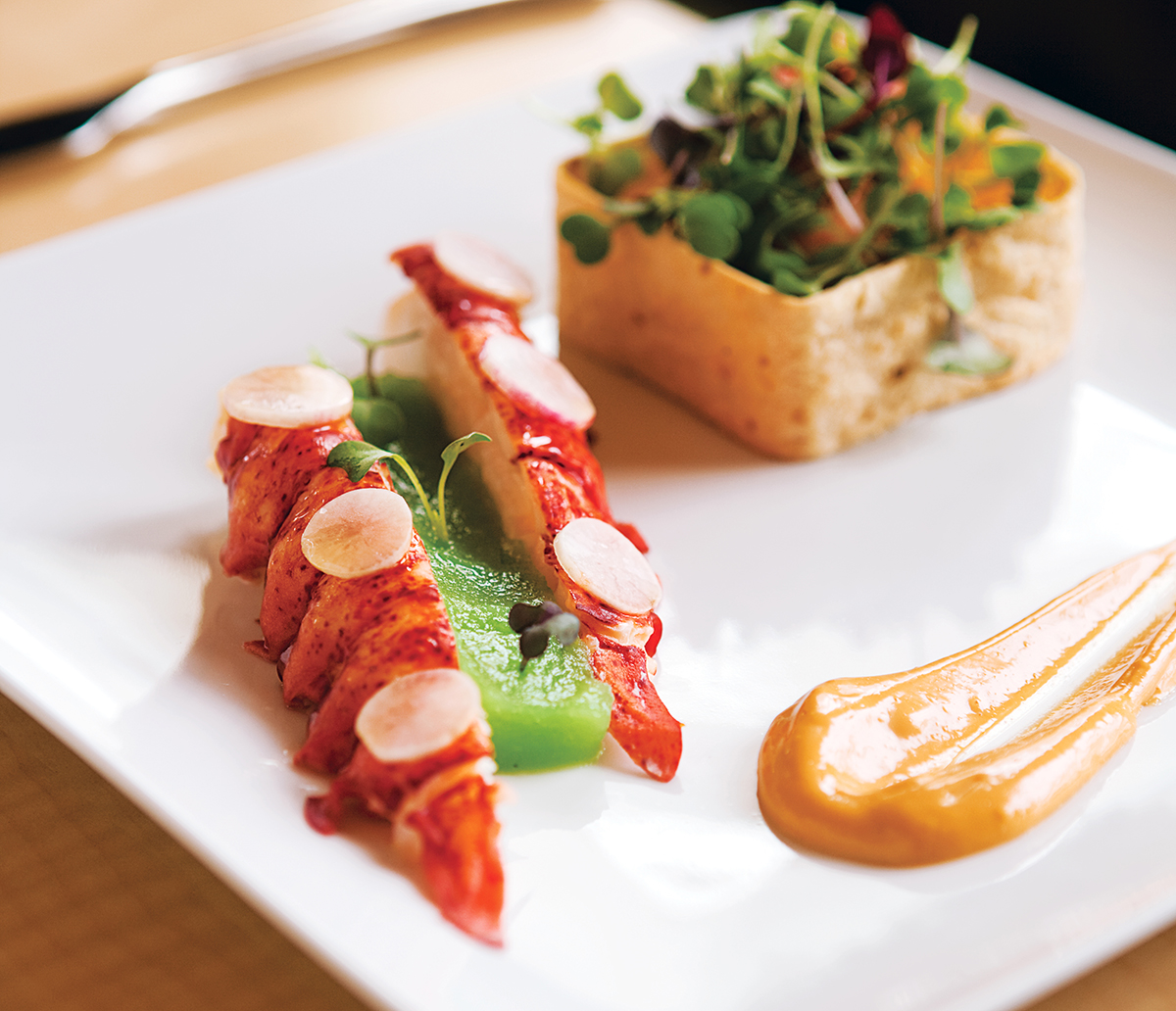Dining Out: Sensing in Boston

Photograph by Keller + Keller
A strange new form of cooking has arrived on the Boston waterfront. It’s highly skilled but delicate, with familiar ingredients like cod, lobster, and asparagus in unexpected pairings with borrowed flavors like tandoori sauce and peppery North African harissa. The plates are lovely to look at, and different from anything being served in the city now. Portions are restrained—though not prices, because this is awfully refined cuisine, after all.
What is this exotic creature? It’s not the Indian-French fusion of Mantra or the pan-Asian-French fusion of Mantra’s closest competitor, Banq, even as its stylish strangeness echoes both. No, it’s something Boston hasn’t seen in a long, long time, though it has certainly come to our shores before: modern French cooking.
Think of that! Not bistro classics, not brasserie fare. We’ve got those covered, by names you can reel off effortlessly. But true French esprit and technique wedded to a quest for lightness, and the irrepressible hankering for Asian and North African flavors (which got into the French bloodstream in the 1970s with nouvelle cuisine and never got out)? Rien de rien.
Now we have it, in a decidedly un-French setting: the new Fairmont Battery Wharf in the North End. It looks exactly like the bland, comfortable hotel it is— one that could just as easily host, say, a rotating series of steakhouses. The room itself is perfectly nice, but the only signs of style are the swooping white plates, the biomorphic flatware, and the open finishing kitchen with high chairs, like a sushi bar.
At the most visible corner you can watch a very intense young man who works under a literal spotlight. You see the concentration in Gérard Barbin’s face and in every precisely controlled movement, the brisk and almost robotic efficiency as he puts the last touch on a dessert plate (a practiced pastry chef, he makes all the desserts, too). He’s one of those everything-trained French chefs who chose his vocation as a teenager, worked his way from the provinces (the mountainous Savoie) to the capital, and hitched his star to a starred chef, in his case Guy Martin.
In an announcement three years ago that raised great excitement, Martin said he would launch his first U.S. venture, Sensing, a version of his Paris restaurant of the same name, at Battery Wharf. He had friends here, he said, and he liked New England produce (how kind!). Whatever the reason, he came and went in a PR flurry early last year, promising a late spring debut. Barbin, deputized by Martin as his chef de cuisine, arrived in April, and waited around – a long time. Barbin may have used the time to get a sense of our local seafood, which he calls “very high quality,” as fine as that of the Brittany coast. But he didn’t seem to get a sense of what other restaurants serve or what Boston diners like. And that’s good. Sensing is as close to dining in Paris as most of us are likely to come for quite a while.
The food is a little precious, and sometimes a little hard to understand. But on the whole it’s very good, with a quality and rigor of thought that makes you think nothing is put on merely for show—like the crushed popcorn, mixed with tangerine zest, around a slice of foie gras terrine ($17), which is not just fun to eat, but also provides interesting textural counterpoint. It’s served with ribbons of raw shaved rhubarb (a bit odd) and rhubarb pickles with honey and apple cider vinegar (not odd at all, as the acid gives balance to the impeccably made terrine). Lobster is the base of the other starter that most impressed me: steamed tail served with a cauliflower purée sweetened and thickened with coconut milk ($19), accompanied by a Granny Smith apple gelée and lobster coral mayonnaise. The crimson and cream colors are coordinated, and so are the sweet and acidic flavors.
Almost everything at Sensing seems governed by a rule of sweet-salt harmony. Much of it has sweetish coconut and soy-milk sauce bases that Barbin says are lighter and cleaner-tasting than butter – and who could disagree? (Well, you could, but not me.) Cod steamed in lemongrass with a coconut-grapefruit sauce ($26) is understandably a bestseller, gossamer-light but not bland. The udon noodles under monkfish tandoori ($26) are in a soy-milk sauce thickened with cooked fennel; you don’t taste the soy and hardly detect the fennel – you taste the tandoori paste that flavors the sauce, and you finish the noodles far too quickly.
Some combinations, like dull char with underflavored lemon confit ($25) and a good loin of lamb in an unpleasantly crunchy tomato crust ($25), don’t quite come together. But the beef strip loin ($32), served with crisp cubes of greaseless chickpea fries, is exemplary meat (served in a sanely French portion), and the accompanying Thai curry and anchovy sauce is gentler than the ingredients make it sound, and perfectly complementary.
The desserts (all $11) aren’t as palate- or eye-catching as the savories. The cutest and most popular is a cristalline of lemon curd and yuzu jelly in the base of a tumbler covered with a crackling, transparent, how’d-he-do-it sugar crust. It’s fun, yet kind of wan, too. I preferred the chocolate torte with crackling crushed caramel, but it has since come off the menu.
Still, I expect good things from Barbin. If, that is, such an adventurous venture survives. I want it to, and I’m pulling for the earnest, enthusiastic, incongruously American servers to keep their jobs, too. With its up-to-the-minute French flair, Sensing is unique in Boston. It needs support—and it needs company.


